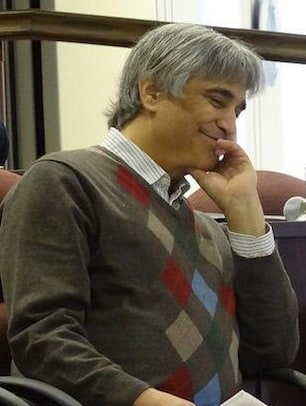
Anthony Esolen is an embattled professor at Providence (R.I.) College, an aggressively Catholic believer at an institution run by Dominican priests but less forthrightly Catholic than he is. Esolen teaches Renaissance literature and the development of Western culture. Among his books is a translation of Dante’s Divine Comedy regarded as one of the best. He is also a well-known personality on Facebook, dealing with subjects from the erudite to the playful.
His articles in conservative Christian journals critical of the diversity movement and identity politics have made him the target of activist students of the left and some professors (most prominently those in the black studies program). These detractors have generated a petition seeking his ouster from his college for “publishing articles that are racist, xenophobic, sexist, homophobic, and religiously chauvinistic.”
of the diversity movement and identity politics have made him the target of activist students of the left and some professors (most prominently those in the black studies program). These detractors have generated a petition seeking his ouster from his college for “publishing articles that are racist, xenophobic, sexist, homophobic, and religiously chauvinistic.”
Esolen has a low opinion of identity politics and the diversity movement and has referred to some of the activists as “narcissists” who want to study only themselves. In an interview with Rod Dreher of the American Conservative last November Esolen said: “The dirty not-so-secret is that the same people who for many years have loathed our Development of Western Civilization program — the focus of curricular hostility — also despise the Catholic Church and wish to render the Catholic identity of the college merely nominal.”
Support for Esolen by the college president, Father Brian Shanley, has been tepid, of the sort sometimes issued by Catholic administrators embarrassed to be interrupted while converting a Catholic college into a formerly Catholic one. Over the weekend, in a Facebook post, Esolen said of his scheduled speech, “Christ and the Meaning of Cultural Diversity,” that if he tried to give it, he had been told that activist students would shut it down. He said on Facebook: “It is no longer clear to me that Providence College would qualify as ‘worth attending’.”
Catholic families sending their children to colleges such as Providence are no different than a cattle rancher hiring a PETA board member to nanny their kids. What you get back is vastly different from the child you started with.
Prof. Esolen is undoubtedly correct. Providence, et al, is probably not worth attending.
Henry Jaffa, in a 1991 lecture, described the problem the Professor wrestles thusly:
“Diversity” is demanded by those who will tolerate no deviation from the “politically correct.” And what is “political correctness” but another name for “the party line”. It is Leninism/Stalinism without Lenin or Stalin. “Racism” is the generic term for any kind of “false (formerly bourgeois) consciousness,” that is to say, for any opinions not considered politically correct. It has nothing to do with what once was called race prejudice—an unreasonable depreciation of other human beings because of their race, color, or ethnic origin. The charge of “racism” is made by the very people demanding racial quotas, race norming, and segregated racial and ethnic centers. To point out the contradiction in these demands—or indeed of any demands made by the politically correct—is to bring on the accusations of “logism,” which means the use of reason, a vice held characteristic of “Eurocentrism”. The contempt for “Eurocentrism” as an endemic vice corresponds closely to Marx’s contempt for the false consciousness engendered in the ruling classes of all societies founded upon private property. “Racism” itself is then nothing but the endemic quality of human consciousness, prior to the transformation of human egotism into human altruism. “Political correctness” is nothing less than the blind and willful insistence upon the fulfillment of the goals of revolutionary Marxism/Leninism, without any reference to that failed enterprise itself, or to any rational political analysis. Indeed, the new political correctness differs from its predecessor only in its insistence that no reason needs to be given as to why it is correct. It is a synthesis of the goals of Marxism with the philosophical (or anti-philosophical) horizon of nihilism.”
You find the entirety of the lecture here: